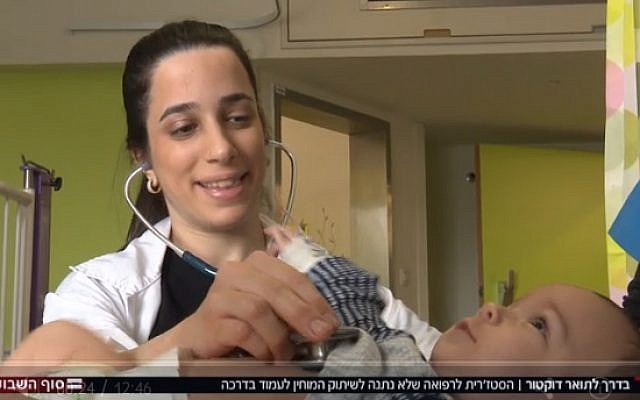Israeli woman with cerebral palsy graduates Technion medical school
Hodaya Oliel, 27, fulfills dream to become doctor, wants to specialize in pediatric neurology
Hodaya Oliel, a 27-year-old woman with cerebral palsy, has fulfilled a lifelong dream to become a doctor after graduating from Technion – Israel Institute of Technology.
“I dreamed about this all my life,” Oliel told Hadashot television news on Saturday.
As a child, Odiel was hospitalized in the orthopedic ward, but “the other half [of the ward] was the children’s neurology ward, and that always interested me.”
Her parents were adamant that Hodaya, diagnosed with , would grow up as normally as possible.
Hadas Odiel, her mother, said she would not let anyone convince them their daughter required a special education.
“The girl speaks and understands perfectly, why put her in a special education kindergarten,” she said, recalling that she and her husband would not let the word “disabled” come out of their mouths.
“It’s not semantics, it’s a way of life” and they always treated her as a normally abled person, her father Michael Oliel said.
After undergoing five operations before entering high school, Oliel graduated with top grades and served for a year in Israel’s national service program for religious girls who choose not to join the military.
In pursuing her medical studies, Oliel found the school building to be a challenge, with no elevators or handrails on the stairs. She also chose to live in an apartment by herself, telling the TV station she did her best not to think of the intensive learning ahead of her and its daily physical challenges.
Professor Ido Fefferkorn of Haifa’s Carmel Hospital said he was impressed by his patients’ reaction to “the small medical student with the big heart.”
“I think that in the end the patient is not interested if the doctor has crutches or glasses or a hearing aid,” Fefferkorn said. “They want a professional person who knows medicine.”
With part of her residency spent in a ward for premature babies, Oliel said, “It is moving because I know that some of them will in fact come out of here in a situation similar to mine.”
Although she is designated as suffering from “light” cerebral palsy, she said, “The question is what is light and for whom exactly is it light? I don’t really feel that it’s light for me because I get up every morning and I have to do my things.”
The head of the premature ward, Professor Ofer Lavi, praised the young doctor’s strength.
